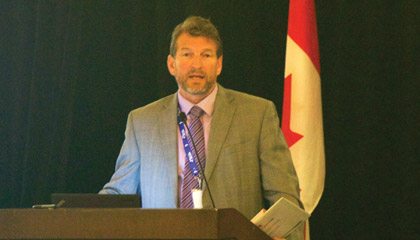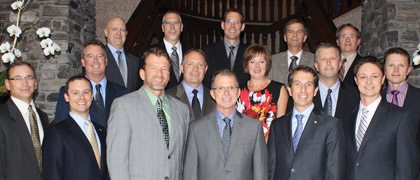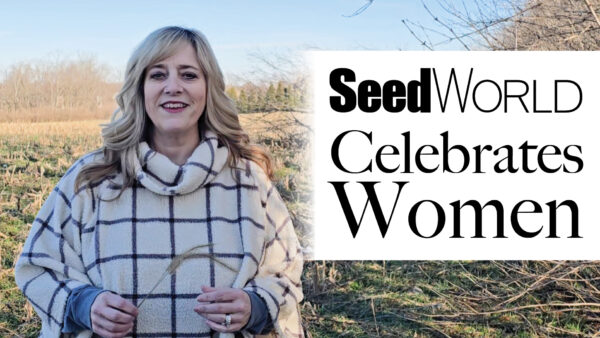
If you missed the association’s annual meeting, let Germination take you there and fill you in on key issues.
The Canadian Seed Trade Association hosted its 91st Annual Meeting in mid-July in Banff, Alta., where more than 350 seed industry professionals met. “We had near record attendance,” said Patty Townsend, CEO of the association. “Overall the conference went really well. Members were very engaged and there were a lot of positive discussions.”
Townsend said the staff walked away from the meeting with a list of priorities to focus on, including stewardship practices in relation to pollinators, communicating more about intellectual property rights and establishing a low-level presence for seed. “We’re working on these issues now and will be able to report our progress on them during our mid-year meeting in November,” she said.
Peter Entz, CSTA 2013-14 president, opened the meeting with an update on a few of CSTA’s activities and issues it dealt with during the past year. During his presidency, Entz said he’s learned three things. The first is CSTA’s role in international policy.
“The rest of the world respects Canada’s position on a lot of issues and on some issues, we lead the discussion,” he said. “Additionally, the diversity of issues the CSTA staff deals with is tremendous. Prior to becoming president, I was more interested in the issues that affected me. And lastly, some of the practices our growers use are starting to be questioned by the general public. We have to make sure we keep people focused on the science, keep people focused on why we do certain things and continue to be transparent and have an educational slant on how we address issues. That’s only going to become more important and we need to make sure that we are fully engaged.”
Peter Entz, CSTA 2013-14 president, welcomed conference attendees.
Meet the 2014-15 CSTA Board of Directors. Pictured from left to right are: (front row) Marty Vermey, Jim Schweigert, Peter Entz, Dave Baute, Scott Horner, Brent Derkatch; (middle row) Kevin McCallum, Duane Johnson, Ellen Sparry, George Lammertsen, Darrell Dziver; (back row) Dan Wright, Jeff Bertholet, Todd Hyra, Wayne Gale and Georges Chaussé.
The Business of Seed
A few of the issues CSTA has been actively engaged with include Bill C-18, pollinator health and value capture. Additionally, the association has been working to increase the international trade of seed.
Entz explained that CSTA has been working as part of a 20-member value chain group called Partners in Innovation, which is designed to educate stakeholders about Bill C-18, specifically Plant Breeders’ Rights, and provides facts and figures to government.
At the time of print, Parliament had not yet resumed but was expected to do so in early September with the House Committee on Agriculture and Agri-food beginning hearings on Bill C-18, which contains amendments to Plant Breeders’ Rights.
“This is an important issue and we’re trying to make sure it remains high on the agenda,” Townsend said, noting that the bill still has a long way to go. “There’s a lot of misinformation out there and we are working to make sure the correct information is communicated.” Townsend hopes Parliament will pass the bill by the end of the year, fearing that if it moves into 2015, the election will jeopardize it.
Additionally, Entz explained that CSTA members and staff have been actively involved in the discussion around bee health, primarily in the provinces of Ontario and Quebec. “We’re keeping tabs on that as the issue evolves and want government decisions to be based on science, even though there’s pressure to do otherwise,” he said.
Townsend added that they’re updating CSTA’s guide for safe handling and storage of seed treatments. “We have been very proactive in communicating with farmers and explaining best management practices associated with seed treatments and the proper handling of treated seed,” she said. “We’ve been working closely with the Pest Management Regulatory Agency and are part of the National Bee Health Forum. Our goal is to make sure seed treatments remain a valuable tool for farmers, but to also minimize our environmental footprint.”
Aside from working on Bill C-18 and protecting pollinators, Entz said the team has been involved with a stakeholder group that’s looking at potential models, outside of the traditional collection model, for capturing royalties on seed. Entz explained that this is important, but it’s not to be confused with Plant Breeders’ Rights.
At the international level, Entz reported that the association is working to build better trade options for those in the seed industry so that they have relatively unrestricted trade of seed globally. “Low-level presence and phytosanitary measures are big,” Townsend explained, adding that the government developed a proposed domestic LLP policy for grain, but not for seed. “We need one for seed, especially with the high number of acres planted to biotech corn, canola and soybeans.” Townsend reported that CSTA is part of a working group that is developing an issue paper that will serve as the foundation of a draft LLP policy for seed. She expects the draft to be complete this fall.
“Regarding phytosanitary issues, we’ve been very active within the International Seed Federation and the Seed Association of the Americas,” Townsend said. The North American Plant Protection Organization’s Regional Standard for Phytosanitary Measures 36 (RSPM 36) was signed by Canada, Mexico and the United States.
At the same time, the International Plant Protection Convention (IPPC) released a draft international standard for phytosanitary measures for country consultation. Because IPPC is comprised of 181 governments, Townsend said “we have to make our voice known to our government so this can be in place to help guide phytosanitary measures that affect seed.”
The Business of the Association
Entz said that CSTA strives to be transparent and works to keep members informed through its Trade Winds email. For the 2013-14 year, Townsend reported that the association welcomed seven new members, including the Association of Alberta Co-op Seed Cleaning Plants, Buckhorn Canada, Gerard Seed Solutions, Group Limagrain, Issues Ink, KWS Lochow and Manitoba Seed Growers Association — bringing total membership to 127.
During the meeting, delegates elected the 2014-15 board of directors. Dave Baute of Maizex Seeds was elected president, while Brent Derkatch of Canterra Seeds was elected second vice-president. Ellen Sparry of S&M Seeds and Wayne Gale of Stokes Seed were elected to the board of directors. Gale also serves as the CSTA representative to the American Seed Trade Association. Additionally, Todd Hyra of SeCan was voted in for a second term.
While the priorities listed above are important, they aren’t CSTA’s sole focus. CSTA continues to work on many fronts including, but not limited to, alternative service delivery of seed crop inspection, seed purity and quality standards, variety registration, human resources for seed businesses, access and benefit sharing of genetic resources, seed industry stewardship and regulatory changes.
Julie Deering
|
Lessons from Hockey Translate to the Seed Industry Four-time Olympic gold medal winner Hayley Wickenheiser compared her experiences of training for the Olympics and being a professional athlete to that of the seed industry. “You reap what you sow,” said Wickenheiser, who was the keynote speaker for the Canadian Seed Trade Association’s 91st Annual Meeting. The woman who holds more gold medals than any other Canadian Olympian explained that all the effort you put into training determines your end-performance. “The day one Olympic Games finishes is the day you begin training for the next one.” The same can be said for seed companies. The minute one crop is finished, farmers and seed representatives are already planning for the next one, continually striving to make each crop better than the previous. “Every little detail along the way counts and you never know which detail is going to come into play when it comes down to that defining moment,” Wickenheiser said, as she described the last day of the team’s boot camp for the 2014 Winter Olympics in Sochi, Russia, as a grueling day of training during which the team mountain-biked B.C.’s Apex Mountain in the rain. “You’re always evolving and working to be the best,” she said. “It’s really performance on demand.” The motto for the 2014 women’s hockey team was “Dig a Little Deeper.” Wickenheiser said that the team had a target on its back and the rest of the world wanted to knock them off. “We knew we had to train harder and train better than the other teams to come out on top,” she said. Wickenheiser told attendees that you must constantly work to reinvent yourself and always prepare because nothing is certain. |
















